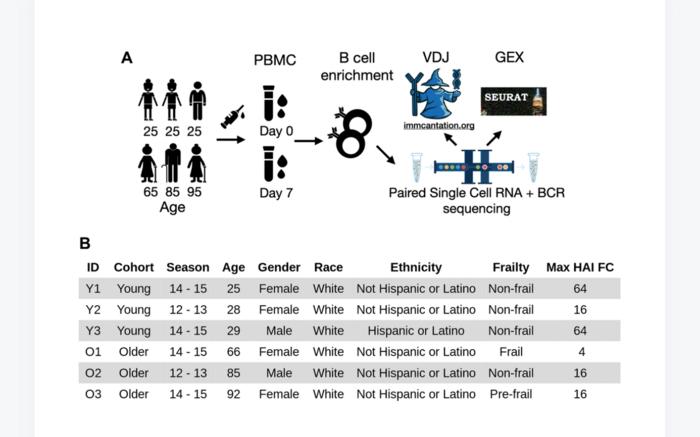“[…] our findings suggest that the age-related decrease in response following influenza vaccination could reflect functional alterations in activated B cells […]”

Credit: 2023 Wang et al.
“[…] our findings suggest that the age-related decrease in response following influenza vaccination could reflect functional alterations in activated B cells […]”
BUFFALO, NY- October 10, 2023 – A new research paper was published in Aging (listed by MEDLINE/PubMed as “Aging (Albany NY)” and “Aging-US” by Web of Science) Volume 15, Issue 18, entitled, “High-throughput single-cell profiling of B cell responses following inactivated influenza vaccination in young and older adults.”
Seasonal influenza contributes to a substantial disease burden, resulting in approximately 10 million hospital visits and 50 thousand deaths in a typical year in the United States. 70 – 85% of the mortality occurs in people over the age of 65. Influenza vaccination is the best protection against the virus, but it is less effective for the elderly, which may be in part due to differences in the quantity or type of B cells induced by vaccination. In their new study, researchers Meng Wang, Ruoyi Jiang, Subhasis Mohanty, Hailong Meng, Albert C. Shaw, and Steven H. Kleinstein from Yale University / Yale School of Medicine investigated this possibility.
“[…] we sorted pre- and post-vaccination peripheral blood B cells from three young and three older adults with strong antibody responses to the inactivated influenza vaccine and employed single-cell technology to simultaneously profile the gene expression and the B cell receptor (BCR) of the B cells.”
Prior to vaccination, the researchers observed a higher somatic hypermutation frequency and a higher abundance of activated B cells in older adults than in young adults. Following vaccination, young adults mounted a more clonal response than older adults. The expanded clones included a mix of plasmablasts, activated B cells, and resting memory B cells in both age groups, with a decreased proportion of plasmablasts in older adults. Differential abundance analysis identified additional vaccine-responsive cells that were not part of expanded clones, especially in older adults.
“To summarize, we showed a quantitative difference in B cell response following vaccination between age groups, with expansion dominated by plasmablasts in the young, and activated B cells in older adults. […] Overall, this study provides insights into the B cell vaccine response differences between young and older adults and may be beneficial to design more effective vaccines in the older age groups.”
Read the full paper: DOI: https://doi.org/10.18632/aging.204778
Corresponding Author: Albert C. Shaw, Steven H. Kleinstein
Corresponding Email: [email protected], [email protected]
Keywords: B cell receptor, repertoire, clonal expansion, aging, single-cell RNA-seq
Sign up for free Altmetric alerts about this article: https://aging.altmetric.com/details/email_updates?id=10.18632%2Faging.https://doi.org/10.18632/aging.204778
About Aging:
Launched in 2009, Aging publishes papers of general interest and biological significance in all fields of aging research and age-related diseases, including cancer—and now, with a special focus on COVID-19 vulnerability as an age-dependent syndrome. Topics in Aging go beyond traditional gerontology, including, but not limited to, cellular and molecular biology, human age-related diseases, pathology in model organisms, signal transduction pathways (e.g., p53, sirtuins, and PI-3K/AKT/mTOR, among others), and approaches to modulating these signaling pathways.
Please visit our website at www.Aging-US.com and connect with us:
- SoundCloud
- X, formerly known as Twitter
- YouTube
- LabTube
Click here to subscribe to Aging publication updates.
For media inquiries, please contact [email protected].
Aging (Aging-US) Journal Office
6666 E. Quaker Str., Suite 1B
Orchard Park, NY 14127
Phone: 1-800-922-0957, option 1
###
Journal
Aging-US
DOI
10.18632/aging.204778
Method of Research
Observational study
Subject of Research
People
Article Title
High-throughput single-cell profiling of B cell responses following inactivated influenza vaccination in young and older adults
Article Publication Date
26-Jun-2023




